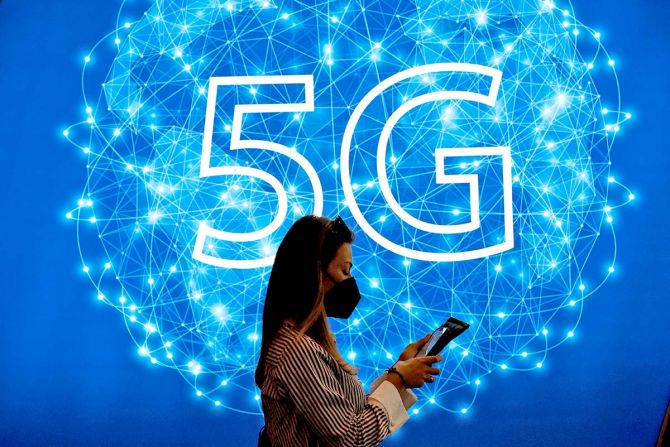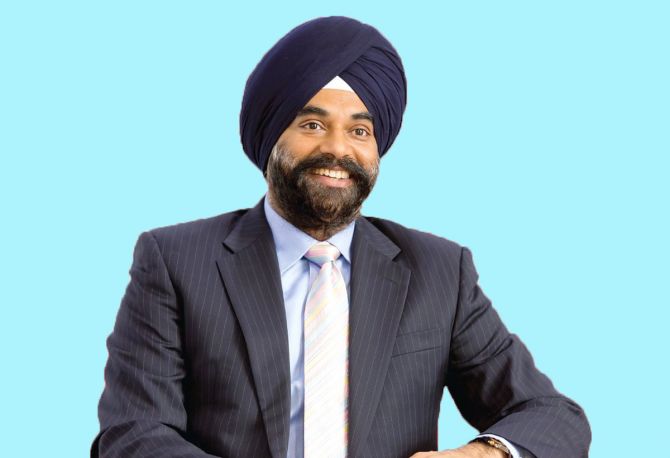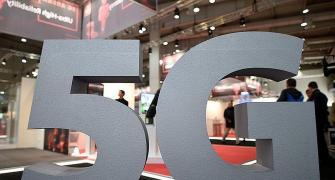'We showcased about 20 use cases in 5G trials in Pune and Gandhinagar and some of them were interesting and innovative.'
'However, which ones will take off and which ones would not be relevant, we don't know yet.'

"There is no use case of 5G today that someone launches it and everyone will say I want it," Ravinder Takkar, managing director and chief executive officer of Vodafone Idea, tells Surajeet Das Gupta and Nivedita Mookerji/Business Standard.
Is Vodafone Idea's struggle to survive over and is the company back on track?
We have managed to navigate our way and got over what I call the existential crisis of whether the company will be there or not.
We're here, we have a great quality network, brand, a business which is growing in the last three quarters and a sense of optimism.
We have promoters who are investing back again which was not the case two years ago and we have a government which has realised that this industry and the three players have to be supported.
It's a very different place from where we were three years ago.
I think struggles are never over, they never do in business, but the fundamental struggle whether we will survive or not is behind us. Our fights are in the market.
The company is raising Rs 25,000 crore (Rs 250 billion). What is this money going to be used for and is it enough?
Today our 4G covers a little over 1 billion Indian population, competitors like Airtel are at 1.2 billion, so we have a 200 million gap to cover for which we require capex.
Second, as we grow our 4G base, we need to add capacity to serve the customers. The bulk of capex requirements in the next three to four years will be in these two buckets.
We require Rs 25,000 crore of additional investment which the board has approved.
Our promoters have recently put in Rs 4,500 crore (Rs 45 billion), so we need about Rs 20,000 crore (Rs 200 billion) more, which will be raised in a combination of debt and equity.
This will be sufficient for us in the coming years in the areas we talked about and will also include investments at least for now in 5G.
What's your view on the 5G market potential in India?
5G is a long haul.
Unlike 4G, where if you have a smart phone you get connected to an ecosystem of apps and high speed broadband, 5G provides a very different connectivity whose use cases are still up in the air and are unclear what they will be.
We showcased about 20 use cases in the 5G trials in Pune and Gandhinagar and some of them were interesting and innovative. However, which ones will take off and which ones would not be relevant, we don't know yet.
We have signed with companies to see how we can develop some of them further, but only time will tell.
There is no use case of 5G today that someone launches it and everyone will say I want it. Even globally there is a search for such use cases and maybe India will be the first one to have it.
But where 5G is good is to provide a significant amount of capacity at a lower cost. So cost per GB on 5G is lower than 4G.
That is because it is a broadband technology and comes with a lot of spectrum. Which means, as we roll out capacity for 4G, if we find that some places require 5G capacity which is cheaper, we could do that.
Many places in the world are doing it. But that is a use case for cost-saving and not an end-use case.
Is Rs 25,000 crore enough for your plans? Will you be bidding aggressively for 5G?
It is sufficient. Of course, we can increase it, and go to the market and ask for more money. We have done recent updates on the business plan and this money seems sufficient.
On how we will bid for 5G, I cannot comment as it is competitive information. But what I can say is that the industry has had a robust and lengthy consultation process with the regulator on 5G.
They have done many things which are good like instead of paying upfront 50 per cent for the spectrum we can now pay on a yearly basis.
The spectrum caps will ensure that spectrum is spread around the industry rather than hoarded by a few players.
They could have reduced the price further, but we believe the government is still discussing it.
Many of your competitors will bid aggressively. So would you like to be left behind?
I can't comment on the 5G strategy. What I can tell you is that 5G has some elements that make it different from 4G, like higher speeds and lower latency.
But as I said earlier, we have not seen anything in the globe of a particular use case today of scale which a billion customers would say I need it today.
It might start with enterprises or with infrastructure like smart cities.
...Will that guide our plans for 5G and how we approach our 5G strategy?
Why should it not?
It makes sense to look at use cases, look at how people are using it before we develop our 5G strategy.
The government will have around one-third shareholding in Vodafone-Idea Ltd. Will there be controls and is there a way to ensure that public money is not lost if the company doesn't perform?
The government plan, as far as I understand, is that it doesn't want to interfere with the company, have an operational role or a board seat. They are just like public shareholders.
With regards to performance, public shareholders do not have any security on performance of the company.

Will the promoters be willing to put in more money?
I think the big point is that a couple of years ago they were not ready to, now they are putting in money.
In any business, Rs 4,500 crore is a big amount. That's what has come from the promoters out of a total requirement of Rs 25,000 crore.
What they will do in future, I can't tell you because it is their money.
As CEO of the company, my job is to work hard to attract that money. Here's a signal that we have done good work for them to put in this money.
Regarding third party capital, there are multiple ways to look at it. One way to look at it is it's a very very positive sign reflecting ultimate confidence in business.
Do you have a target in mind on average revenue per user per month (ARPU) for Vodafone Idea?
The short-term ARPU target needs to be Rs 200 per subscriber per month.
If you look at a three-year horizon, the target can be Rs 250 and in a longer term it can be Rs 300.
So share of the customer wallet is very small. And the value it provides is very big.
Are we anywhere close to the next round of tariff hike?
That's a tricky question. There's no date because there are a lot of factors to look at before a tariff increase.
Like we have said and done before, Vodafone Idea will not be shy of taking a lead in tariff hike ...
Vodafone Idea has been a third player for long. Is there any plan to go up the pecking order?
Pecking order has never driven who we are as a business and what we do.
What's important is to create a quality service and a great experience while giving returns to shareholders. That's the priority.
It doesn't matter what the number is in the pecking order. That's never been a boardroom discussion for us.
There's no ego issue here that we have to be the biggest telecom provider.
Who's bigger competition? Bharti Airtel or Reliance Jio?
Everybody is competition.
Vodafone Group has faced many challenges in India and retrospective tax was perhaps the biggest. With several multinationals exiting India, what are your thoughts on India as an investment destination?
Telecom has always been at the heart of consumer engagement.
With 700 to 800 minutes of talk time every month and high data usage, 4G penetration at 56 per cent and smartphones at 58 per cent, I cannot think of a better place than India as a destination.
The opportunity is huge.
Bharti Group chairman Sunil Mittal recently referred to the culture incompatibility between the Vodafone Group and Idea. Do you agree?
I can't comment on what he meant.
But was the difference in culture a challenge in the merger between the two?
The answer is no. We had other struggles and challenges in one of the biggest integration that the world has seen.
What has been a bigger challenge? Regulatory or Jio?
Disruption caused by Jio resulted in industry consolidation and low tariffs.
Then there were regulatory issues. It wasn't just one or the other.
Bharti Airtel also faced those challenges. So why did it impact Vodafone Idea so much more?
Life and history of companies go on. Vodafone history will continue to be written.
It's the same for Bharti. It's not a straight line. Ups and downs are part of the game.
It would have been very easy for us to give up. But we didn't.
We are all geared to make it go and be a part of history.
Feature Presentation: Ashish Narsale/Rediff.com









